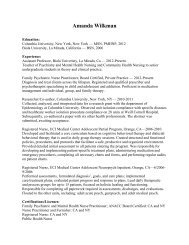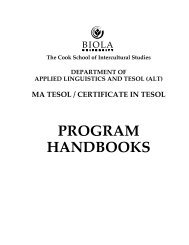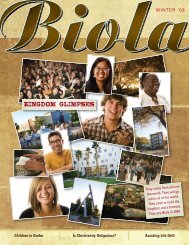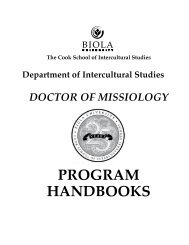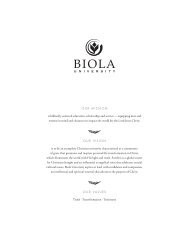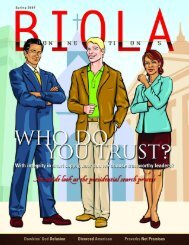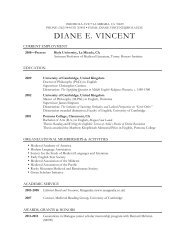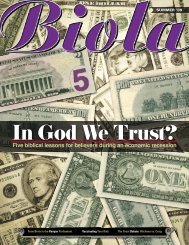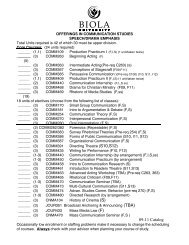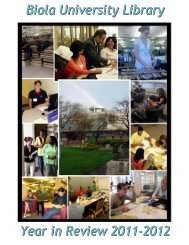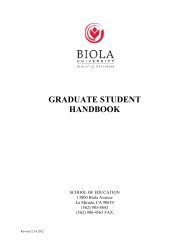A growing number of Christians are embracing the ... - Biola University
A growing number of Christians are embracing the ... - Biola University
A growing number of Christians are embracing the ... - Biola University
Create successful ePaper yourself
Turn your PDF publications into a flip-book with our unique Google optimized e-Paper software.
About five years ago, <strong>Biola</strong> pr<strong>of</strong>essor J.P.<br />
Moreland touched down in Tennessee<br />
for a brainstorming session with some <strong>of</strong><br />
<strong>the</strong> nation’s leading Christian thinkers.<br />
Their goal: to put toge<strong>the</strong>r a list <strong>of</strong> some <strong>of</strong><br />
<strong>the</strong> toughest and most important questions<br />
facing Christianity and <strong>the</strong> Bible, and to give<br />
<strong>Christians</strong> a resource that <strong>of</strong>fered <strong>the</strong> answers.<br />
The result is The Apologetics Study Bible, a<br />
new tool that features articles, notes and<br />
commentary from dozens <strong>of</strong> noted Christian<br />
apologists — many <strong>of</strong> whom teach or studied at<br />
<strong>Biola</strong> — all aimed at defending <strong>the</strong> faith.<br />
“It’s not just ano<strong>the</strong>r study Bible that is commenting<br />
on <strong>the</strong> biblical text,” said Moreland, distinguished<br />
pr<strong>of</strong>essor <strong>of</strong> philosophy at <strong>Biola</strong>’s<br />
seminary, Talbot School <strong>of</strong> Theology. “It is a study<br />
Bible whose sole focus is answering questions that<br />
surface from <strong>the</strong> text. It really does have to do with<br />
answering questions about <strong>the</strong> reliability <strong>of</strong><br />
Scripture, <strong>the</strong> truth <strong>of</strong> Christianity and <strong>the</strong> reality<br />
<strong>of</strong> God.”<br />
As one <strong>of</strong> five editors on <strong>the</strong> project,<br />
Moreland generated article topics, authored<br />
several <strong>of</strong> <strong>the</strong>m himself and solicited contributions<br />
<strong>of</strong> articles and biblical commentary from<br />
o<strong>the</strong>rs. Nearly 20 <strong>Biola</strong> pr<strong>of</strong>essors and alumni<br />
— one-fifth <strong>of</strong> <strong>the</strong> total <strong>number</strong> <strong>of</strong> contributors<br />
— ultimately played a role in <strong>the</strong> effort.<br />
Toge<strong>the</strong>r, <strong>the</strong>y wrote brief articles that <strong>are</strong><br />
sprinkled throughout <strong>the</strong> pages <strong>of</strong> <strong>the</strong> Bible,<br />
answering such questions as “Aren’t all religions<br />
basically <strong>the</strong> same?” “Does <strong>the</strong> existence <strong>of</strong> <strong>the</strong><br />
mind provide evidence for God?” and “How can<br />
<strong>the</strong> Bible affirm both divine sovereignty and<br />
human freedom?” Several Talbot pr<strong>of</strong>essors also<br />
wrote introductions to books <strong>of</strong> <strong>the</strong> Bible and<br />
notes commenting on individual verses.<br />
Thomas Finley, chair <strong>of</strong> Talbot’s Old Test -<br />
ament and Semitics department, wrote <strong>the</strong><br />
introductions and commentary notes for each <strong>of</strong><br />
<strong>the</strong> minor prophets — 12 books in all.<br />
“They wanted us to deal with specific<br />
questions that somebody might have, especially<br />
<strong>of</strong> an apologetic nature, but <strong>the</strong>y could be more <strong>of</strong><br />
an explanatory nature too,” Finley said. “I had to<br />
think, ‘How would a skeptic think about this?’”<br />
Finley said he researched criticisms <strong>of</strong> <strong>the</strong><br />
Bible, looking for supposed errors or<br />
inconsistencies with <strong>the</strong> biblical texts that he<br />
could help to refute or explain.<br />
Jonah, for example, is <strong>of</strong>ten accused <strong>of</strong> being<br />
a false prophet because he said Ninevah was going<br />
to be overthrown after 40 days, and it wasn’t,<br />
Finley said. In his commentary, Finley noted that<br />
some argue <strong>the</strong> Hebrew word for “overthrow” is<br />
ambiguous, and could simply mean “turn around”<br />
or “be changed” — which certainly happened<br />
when <strong>the</strong> city’s people repented. But a better<br />
explanation, he said, was that God intended for<br />
Jonah’s prophecy to be conditional on <strong>the</strong> reaction<br />
<strong>of</strong> <strong>the</strong> people.<br />
Finley said <strong>the</strong> Bible project, and <strong>Biola</strong>’s<br />
strong involvement with it, reinforces <strong>the</strong><br />
<strong>University</strong>’s standing as a leader in biblically<br />
centered education.<br />
“It shows that we have a strong emphasis on<br />
reaching out to <strong>the</strong> lost, reaching out to <strong>the</strong><br />
world,” Finley said. “And also that we have a very<br />
robust faith, and that we’re not just shutting <strong>of</strong>f<br />
our mind. We’re using our minds to delve into<br />
<strong>are</strong>as that <strong>are</strong> pretty significant today.”<br />
Moreland, a prolific author who has written<br />
extensively about <strong>the</strong> development <strong>of</strong> <strong>the</strong><br />
A B O U T T H E B I B L E<br />
<strong>Biola</strong> Pr<strong>of</strong>essors Team Up to Defend Scripture<br />
Nearly one-fifth <strong>of</strong> <strong>the</strong> contributors to <strong>the</strong> new Apologetics Study Bible have a connection to <strong>Biola</strong>.<br />
Christian mind, said he hopes <strong>the</strong> study Bible<br />
will help <strong>Christians</strong> answer <strong>the</strong>ir own questions<br />
and doubts as well as enable <strong>the</strong>m to present<br />
Christianity more effectively to o<strong>the</strong>rs —<br />
especially in <strong>the</strong> face <strong>of</strong> ever-more-vitriolic<br />
attacks from <strong>the</strong> so-called “new a<strong>the</strong>ists.”<br />
Understanding what <strong>the</strong> Bible teaches and<br />
knowing <strong>the</strong> evidence for its truth is a part <strong>of</strong> <strong>the</strong><br />
biblical command to love God with <strong>the</strong> mind, he<br />
said. It’s also a way to build courage and effect -<br />
iveness in evangelism, he said.<br />
And while some criticize <strong>the</strong> field <strong>of</strong><br />
apologetics for being too argumentative or<br />
focused on simply winning debates with critics,<br />
Moreland said it’s really all about helping people<br />
to overcome barriers to faith.<br />
“At <strong>the</strong> end <strong>of</strong> <strong>the</strong> day, people can’t believe<br />
things that <strong>the</strong>y think don’t make sense,” he said.<br />
“If a person legitimately has questions, <strong>the</strong>y<br />
deserve answers to those questions, and that’s<br />
really all that apologetics is.” – Jason Newell<br />
F A L L ’ 0 8 3 9<br />
Brian Miller



